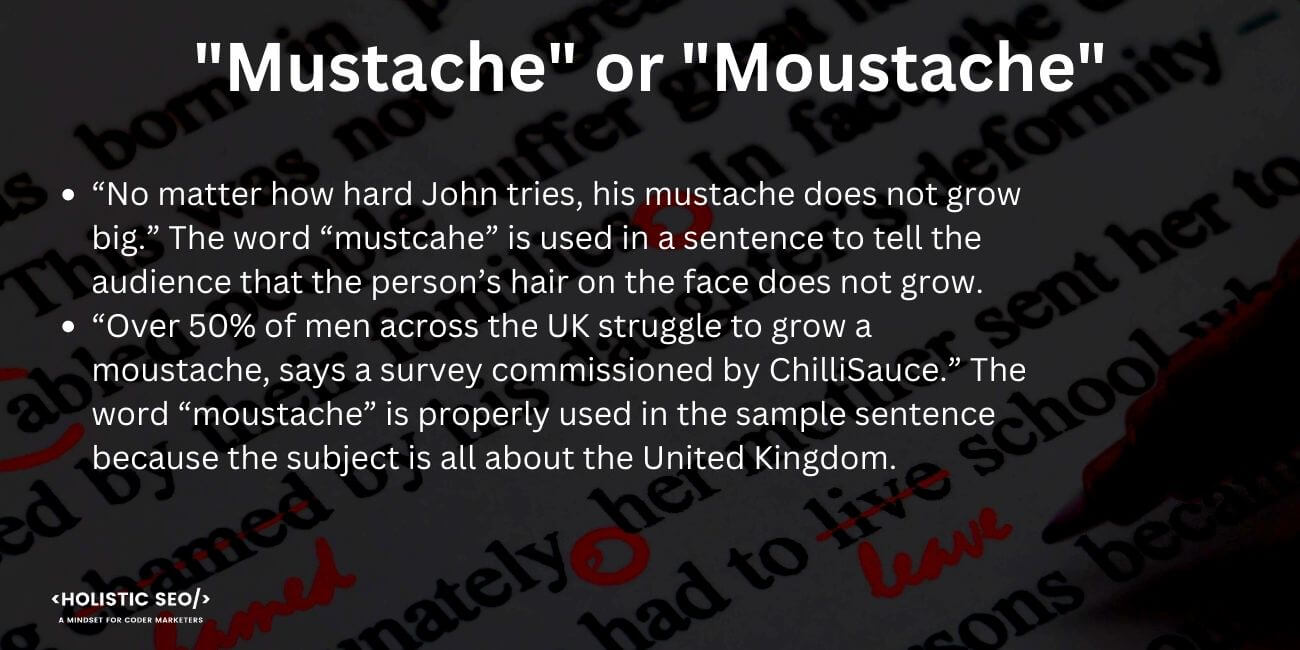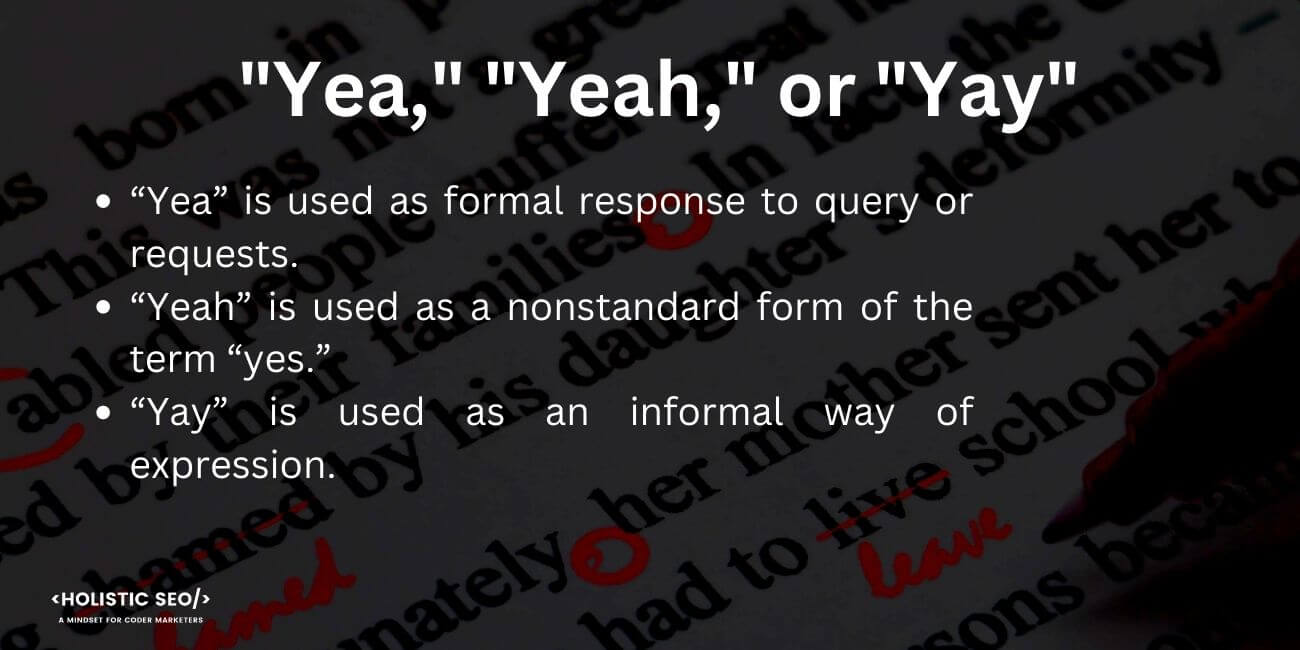The word “moustache” is the traditional spelling in British English. On the other hand, the term “mustache” is the standard and correct spelling in American English. “Mustache” and “Moustache” only differ in the kind of English that is used to spell them. The single thing that differentiates the use of both words is the dialect in which they are spoken. The terms “mustache” and “moustache” refer to the upper lip’s hair. The words “mustache” and “moustache” are both nouns. The spelling “mustache” is the one that is recommended and most frequently used for authorship that is intended for American readers. Meanwhile, the word ‘moustache” is for readers in British English as the suggested and more common spelling form. “Mustache” and “Moustache originated from the Greek word “mustax” ffand Italian word “mostaccio” in the late 16th century. On top of that, the words “mustache” and “moustache” are used in a similar context. Constructing sentences that are understandable and clear to American or British readers is crucial. The writer always needed to consider the future readers of the article. Using the words vice versa, such as “mustache” and “moustache” interchangeably is improper when writing for readers in the United States or the United Kingdom.
Listed below are the example sentences for the word “mustache” and “moustache.”
- “No matter how hard John tries, his mustache does not grow big.” The word “mustcahe” is used in a sentence to tell the audience that the person’s hair on the face does not grow.
- “John’s mustache must extend farther than the end of his lips, but to a reasonable degree.” The word “mustache” is used in a sentence correctly to describe the hair on the face.
- “Over 50% of men across the UK struggle to grow a moustache, says a survey commissioned by ChilliSauce.” The word “moustache” is properly used in the sample sentence because the subject is all about the United Kingdom.
- “After five years of preparation, Peter is finally ready to enter the moustache competition.” The word “moustache” is used in the sample sentence, alternatively describing the hair on the face.
What is the Difference between Mustache and Moustache?
The distinction between the words “mustache” and “moustache.” is determined by the language in which the words are used. The term “moustache” is used in British English, while the word “mustache” is used in American English and other English-speaking countries. People who speak American English, primarily in the United States, use the word “mustache.“ The spelling of the word “moustache” with the letter “u” is the most frequently used in British English.
Do Mustache and Moustache mean same thing?
Yes, the word “mustache“ in American English and the word “moustache“ in British English have the same meaning. Meanwhile, people who speak British English, primarily in the countries such as the United Kingdom, Canada, and Australia, use the word “moustache.” These words are used to identify the hair on the upper lips. “Mustache” and “Moustache” is the hair on the upper lips, commonly seen in men. The words are both acceptable spellings in the English language, and both versions of the word “mustache” and “moustache” are acceptable grammatically.
How to Spell Mustache and Moustache?
The words “Mustache and moustache” are both correct in terms of spelling. The American English word “mustache” is spelled as normally as the way it is pronounced. Meanwhile, the British English word “moustache” is spelled differently; the spelling is with the letter “o.” However, when it comes to their pronunciation, the American English word “mustache” is pronounced as “muh-stach.” On the other hand, the British English word “moustache” is pronounced as “muh-staach.” The British English word “moustache” is pronounced with an accent, while the word “mustache“ is pronounced normally the way it is.
How to Use “Mustache” in American English?
Mustache is used to describe the hair of the upper lip in American English. The word “mustache” is primarily used in American English. It has been used since at least the mid-20th century. The word “mustache” is the only acceptable spelling within American English. Therefore, the American English language must be used for American readers.
Listed below are the four example sentences for the word “mustache” in American English.
- The taxi driver is tall, dark-haired, and unshaven with a pencil-thin mustache, set down his hamburger.
- Pete was dressed in a dark-blue suit and had a mustache and goatee.
- He was tall and thin and wore a mustache.
- The guy had black hair and a mustache.
How to Use “Moustache” in British English?
Moustache shares the same meaning as the word “mustache” in American English. The word “moustache” has been the preferred variant since the mid-19th century. The word “moustache” is the standard spelling in British English. The word “moustache gained frequency in British contexts. “Moustache” is now the standard spelling in general British use. However, when it comes to American English, the word “moustache” is considered an incorrect spelling. The standard spelling to use outside North America, including British and Australian English, is “moustache.” The British English language must be used for British readers.
Listed below are four example sentences for the word “moustache” in British English.
- He used a little pair of scissors to trim his moustache.
- John decided to grow a moustache.
- The famous actor was wearing a false moustache.
- One man seemed to always have some on his moustache.
What are the Common Phrase Combinations of “Mustache” and “Moustache”?
Listed below are the common phrase combinations of “mustache” and “moustache.”
| English Word | Definition | Phrase Combination | Example Sentences of Phrase Combination |
| Center | The American English word “mustache” as a verb means the hair on the upper lips. The American English word “mustache” as a noun means a strip of hair left to grow above the upper lip. | “A mustache on” “His mustache” | A mustache on his face grew big. His mustache is twisted upwards. |
| Centre | The British English word “moustache” has the same meaning as the word “mustache” in American English. It is a strip of facial hair grown above the upper lip. The British English word “moustache” as a noun means the unshaved growth of hair on the upper lip. | “The moustache of” “A moustache” | The moustache of the man never grows. A moustache is used to disguise his protection. |
The table explains that the spelled words “mustache” and “moustache“ have no meaning difference. The words “mustache” and “moustache” only differ depending on which dialect is being used. The spelled word “mustache” is used only in American English. On the other hand, the spelled word “moustache” is used only in the British English language. Therefore, when writers use these words interchangeably, they risk losing the trust of potential readers. The proper use of these spelled words, “mustache” and “moustache“ depends on the audience of the content.
What are the Example Uses of “Mustache” in American Publications?
Listed below are the example uses of “mustache“ in American Publications.
- “Like a lot of men, in pursuit of novelty and amusement during these months of isolation, I grew a mustache.” The phrase was from the publication of The New York Times. The example phrase was how Wesley Morris led him to a deep consideration of his blackness during the Covid-19 pandemic. The example was published during the year 2020.
- “According to the twentieth-century gender code, a clean-shaven man’s virtue was his commitment to his male peers and local, national or corporate institutions. The man with a mustache, by contrast, was much more his own man: a patriarch, authority figure, or free agent who was able to play by his own rules.” The example phrase is about the “Mustaches and Masculine Codes in Early Twentieth-Century America.” The example was published during the year of 2011.
What are the Example Uses of “Moustache” in British Publications?
Listed below are the example uses of “moustache“ in British Publications.
- “During the Napoleonic Wars in the 1800s, British officers were inspired by the coxcombical Frenchmen, with their whiskers being ‘appurtenances of terror’. In the newly colonized lands of India, the moustache was a symbol of male prestige.” The example phrase comes from the historical article, which is about how prominent the “moustache” was in the 1800s. The example was published during the year of 2010 by the author named Debabrata Mukherjee.
- “Entertaining and informative, this fascinating foray into our hairy past is the perfect gift for the pogonophile in your life – or indeed anyone interested in the long and curly history of moustaches, whiskers, and beards.” The example phrase is the article’s introduction about “Moustache, Whiskers, and Beards.” The example was published during the year of 2014 by the author named Lucinda Hawksley.
How to Use “Mustache” or “Moustache” for Content Marketing?
The use of the words “mustache“ and “moustache“ in content marketing depends on the type of audience. The content writer has choices about what kind of spelling words to use. The spelled word “mustache“ is only used in American English. It is the preferred language choice in American English. Meanwhile, the spelled word “moustache“ is only to be used in British English, as it is the preferred spelling choice for their language. Using these spelled words properly in content marketing contributes to a better ranking. Additionally, properly using better-spelled words generates a larger audience than misusing these words. Moreover, using the right words and understanding the audience provides insights into unmet needs. The strategy allows a business to develop its product or service offering better.
How does Accent Differences Affect Search Engine Optimization?
Accent matters and significantly impacts search marketing results in specific languages, not just in English. The search results for all the different accents suggest but do not guarantee, that the algorithm treats them all differently. However, the rankings all vary, though there is some overlap, with the top places changing less than lower first-page listings. The algorithm treats different spellings differently. It only means the opportunities exist and affect multiregional SEO guides for clever marketers. International SEO specialists like to talk about the importance of “accents,“ those marks that reside either above, below, or between existing characters in a piece of text in the appropriate language for search engine algorithms. On top of that, having an accent matters when writing content for search engine optimization (SEO). Therefore, using accents for different audiences helps rank the website or content in various search engine optimization (SEO) international techniques.
What are the Similar Accent Differences such as “Mustache and Moustache”?
Listed below are the similar accent difference such as “mustache“ and “moustache“
- Oestrogen” and “Estrogen”: The words “oestrogen” and “estrogen” are similar to the other accent words “mustache” and “moustache.” The spelled words are similar to the words “mustache” and “moustache.” because both have the same definitions when used in a sentence, but vary in dialect. The words “oestrogen” and “estrogen” shares the same meaning. The two words are the synonym of work or effort. Furthermore, the word “oestrogen” is more common in British English, while the “estrogen” is more common in American English.
- “Licence” and “License”: The words “licence” and “license” are similar to the other accent words “mustache“ and “moustache.“ The mentioned words are similar to the words “mustache“ and “moustache.“ because both have the same definitions when used in a sentence but vary in dialect. The words “licence” and “license” share the same meaning. The two words are synonyms for work or effort. Furthermore, the word “licence” is more common in British English, while “license” is more common in American English.
- “Favor“ and “Favour“: The words “favor“ and “favour“ are similar to the other accent words “mustache“ and “moustache.“ The words are similar to the given words “mustache“ and “moustache.“ because both have the same definitions when used in a sentence but vary in dialect. The words “favor“ and “favour“ have the same meaning: something nice that one does to help. The only difference between the two is that “favor“ is the preferred spelling in American English. Meanwhile, the word “favour“ is the preferred spelling in the British English language.
- “Humor” and “Humour“: The words “humor“ and “humour” are similar to the other accent words “mustache“ and “moustache.“ The example words are similar to the words “mustache“ and “moustache” because both have the same definitions when used in a sentence but vary in dialect. The spelled words “humor“ and “humour“ have the same meaning. It is the ability to be amused by something seen, heard, or thought about. The only difference between the two is that the word “humor“ is the preferred language for American English. On the other hand, the spelled word “humour“ is the preferred language used for British English.
- “Liter“ and “Litre“: The words “liter“ and “litre“ are similar to the other accent words “mustache“ and “moustache.“ The example words are similar to the words “mustache“ and “moustache” because both have the same definitions when used in a sentence but vary in dialect. The spelled words “liter“ and “litre“ have the same meaning. The two words have the same meaning. The word means a metric unit of volume. The difference between the two is the preferred dialect an individual uses. The spelled word “liter“ is the preferred choice of spelled word in the American English language. On the other hand, the preferred choice of spelled words for the British English language is “litre.“
- “Labour” and “Labor”: The words “labour“ and “labor“ are similar to the other accent words “mustache“ and “moustache.“ The words are similar to the words “mustache“ and “moustache” because both have the same definitions when used in a sentence but vary in dialect. The words “labour” and “labor” have the same meaning. The two words are synonyms for work or effort. Furthermore, “labour” is more common in British English, while “labor” is more common in American English.
- 48 Online Shopping and Consumer Behavior Statistics, Facts and Trends - August 22, 2023
- B2B Marketing Statistics - August 22, 2023
- 38 Podcast Statistics, Facts, and Trends - August 22, 2023



Great article about aSEO writing.